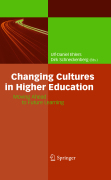
Changing cultures in higher education: moving ahead to future learning
Ehlers, Ulf-Daniel
Schneckenberg, Dirk
More and more educational scenarios and learning landscapes are developed using blogs, wikis, podcasts and e-portfolios. Web 2.0 tools give learners more control, by allowing them to easily create, share or reuse their own learning materials, and these tools also enable social learning networks that bridge theborder between formal and informal learning. However, practices of strategic innovation of universities, faculty development, assessment, evaluation and quality assurance have not fully accommodated these changes in technology and teaching. Ehlers and Schneckenberg present strategic approaches for innovation in universities. The contributions explore new models for developing and engaging faculty in technology-enhanced education, and they detail underlying reasons for why quality assessment and evaluation in new – and often informal – learning scenarios have to change. Their book is a practical guide for educators, aimed at answering these questions. It describes what E-learning 2.0 is, whichbasic elements of Web 2.0 it builds on, and how E-learning 2.0 differs from Learning 1.0. The book also details a number of quality methods and examples, such as self-assessment, peer-review, social recommendation, and peer-learning,using illustrative cases and giving practical recommendations. Overall, it offers a step-by-step guide for educators so that they can choose their own quality assurance or assessment methods, or develop their own evaluation methodology for specific learning scenarios. The book addresses everyone involved in higher education – university leaders, chief information officers, change and quality assurance managers, and faculty developers. Pedagogical advisers and consultants will find new insights and practices for the integration and management of novel learning technologies in higher education. The volume fosters in lecturers and teachers a sound understanding of the need and strategy for change, and it provides them with practical recommendations on competence and quality methodologies. Details strategic approaches for innovation in higher education Presents numerous case studies showing how Web 2.0 technologies affect andchange e-learning Shows many examples of successful education innovation in universities Delivers step-by-step guidance for quality assurance in E-learning2.0 INDICE: 1) Introduction - Changing Cultures in Higher Education - 2) New Challenges for Universities - 3) Learning Innovation for the 21st Century - 4) Changing Worlds of Learning - 5) Transforming Universities.- Section A: New Strategies for a Culture of Change and Innovation in Universities.- 6) Shaping Learning Cultures - 7) Faculty Development in Context - 8) Open Content and Open Learning 2.0 - 9) Strategic Integration of Open Educational Resources in Higher Education - 10) New Directions for Higher Education - 11) Making User-Generated Content Communities work in Higher Education - 12) Strategic Issues in University Information Management - 13) Cretaing the Future - 14) Using Appreciative Inquiry for an E-Learning Change Management Programme - 15) Fostering Connectivity and Reflection as Strategic Investment for Change.- Section B: E-Competence and Faculty Engagement for E-Learning.- 16) What is E-Competence ? - 17) Learning in Communities - 18) Supporting Changing Cultures through Emerging Practices - 19) Conspiracies and Competences - 20) Education Innovation - 21) The Homo Zappiens and Its Consequences for Learning in Universities - 22) Roles and Domains to teach in Online Learning Environments - 23) The Impact of Collaborative E-Learning on Concepts of Teaching.- Section C: Innovation and Quality through E-Learning in Universities.- 24) Moving from Control to Culture in Higher Education Quality - 25) Quality for Global Knowledge-Intensive Organizations - 26) Innovation and Quality for New Learning Cultures - 27) Can Web 2.0 and Social Software help transform how we measure Quality in Teaching, Learning, and Research - 28) The Development of a Theoretically Sound Concept of Quality Criteria - 29) MedidaPrix Award - 30) The UNIQUe experience - 31) The Organizational Impact of Open Educational Resources.
- ISBN: 978-3-642-03581-4
- Editorial: Springer
- Encuadernacion: Cartoné
- Páginas: 610
- Fecha Publicación: 21/11/2009
- Nº Volúmenes: 1
- Idioma: Inglés
